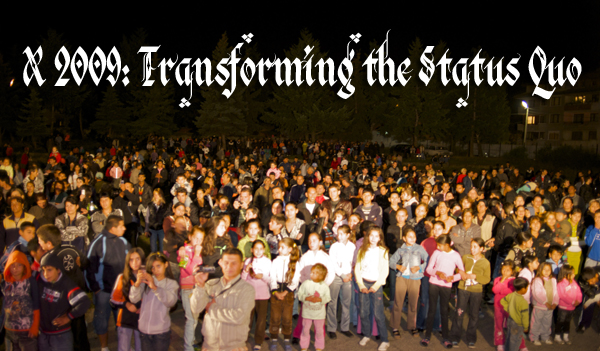M3: Mobile Power for the Ministry
After traveling almost 4,000 miles, I am finally at the 2010 BibleTech listening to Antoine’s talk on mobile technology in the ministry. Antoine is the main guy behind the Mobile Ministry Magazine and a great friend, but I am sitting in his lecture for more than just the code and the algorithm. I am a practitioner in the ministry.
Thousands of Bulgarian speaking people across the globe rely on our team every day to receive a verse from the Bible via SMS. Our Bibliata.TV website has become the Bulgarian GodTube with over 10,000 daily visitors, 1,500 active uploaders and hitting a half petabite monthly traffic in video exchange. So, I am more than just a listener – I am here for the power of the experience.
I met Antoine last year at BibleTech in Seattle. I shared with him our ministry in Bulgaria and abroad, and he offered to help us. Not long after the conference, I received in my office a Nokia 5800, which according to Antoine had more than one advantage over the iPhone, but the one that concerned me the most was the uStream app.
Speaking at the Leadership Development Institute earlier that year, I mentioned uStream but being busy with other projects never paid too much attention to it. Now, I had a reason to try it. No more than five minutes after opening the FedEx package I was broadcasting LIVE on a dozen of our ministry’s websites. Five more minutes and people were actually watching. Hundreds of them.
WOW! I stopped for a pause, because my heart was racing. The potential of one small mobile device applied to the ministry of the church was overwhelming and I needed to pray.
A week later I had convinced two Bulgarian churches to broadcast their services via uStream. Two more joined on the following Sunday, one of them being a Bulgarian speaking congregation in Chicago. A Bulgarian minister from Spain began broadcasting on Thursday nights as over 50 people were logged in and ready to watch 30 minutes before his broadcast. We then put LIVE online the annual conference of Bulgarian churches in North America. Then the Global Day of Prayer from downtown Sofia was watched by 35,000 people LIVE on our Bibliata.com website.
Before we ever returned for our ministry term in Bulgaria, we had over a dozen churches broadcasting LIVE services on Sunday alone plus additional LIVE services on every night of the week except Monday. We received hundreds of emails with testimonies of dramatic healings and life transformations. And this has been going on for over one year now. All because of a small portable telephone that can fit on the palm of my hand and travel with me oversees in the pocket of my blue jeans. I guess I can say it like this: this phone was made for preaching!
John Maxwell says that while training followers adds to your church, training leaders multiplies it. I call this the G2 effect – the growth of the church in a geometrical progression. Like the story of chess boards (2, 4, 16, 256, etc). But the use of mobile technology in the ministry multiplies its effectiveness tridimensionally, adding to it a mobile dimension as a Rubik Cube. I call it M3 – a mobile motivational ministry factor that is unprecedented. And this is something the church cannot afford to miss if it wishes to remain relevant in postmodernity.
Lecturing at the University of Nebraska

Christmas in Bulgaria: Appreciating the Simple Things in Life
 Roasting chestnuts over an open fire and Jack Frost nipping at your nose is a comforting carol which brings many pleasant feelings around the holidays. These are two features, which are not only common to the States, but to Bulgaria as well. This is the season of chestnuts being roasted, however it is not like we picture being over a cozy fire place in a warm home. In Bulgaria it would be on the street side to sell in order to bring in some income for your family. And the Jack Frost is not just a nip for some, but it is a bone chilling cold due to not being able to afford the electric bill.
Roasting chestnuts over an open fire and Jack Frost nipping at your nose is a comforting carol which brings many pleasant feelings around the holidays. These are two features, which are not only common to the States, but to Bulgaria as well. This is the season of chestnuts being roasted, however it is not like we picture being over a cozy fire place in a warm home. In Bulgaria it would be on the street side to sell in order to bring in some income for your family. And the Jack Frost is not just a nip for some, but it is a bone chilling cold due to not being able to afford the electric bill.
For some, there will be no gift under the tree and for others there will not even be a tree. This is not said to bring you sorrow, but for you to appreciate the simple things in life. Enjoy family, friendships, a warm home, a hot meal, your health. Enjoy the time the Lord has given you and use it for his Glory and not for bickering or complaining over the small angst.
Don’t loose sight of the true meaning of Christmas. Christmas is not about the material, but it is about the spiritual. It is about the birth of our Lord and Savior even though our politically correct society wants to get ride of the “Christ” in “Christmas.” If it were not for His birth, He would not have been able to die for our sins. This remission of sin is the ultimate gift this Christmas season for it is through this act that we are able to have eternal life if we only ask.
So when you wake up on the 25th begin your day not consumed with what you didn’t get or what didn’t happen to your liking, but in silence remembering the silent and holy night over 2000 years ago. Remember those less fortunate in order not to take for granted with what you have been blessed. And most of all thank Him for His gift to you. Let these thoughts bring you comfort this holiday season.
Merry CHRISTmas 2009
From all of us in Bulgaria!
2009 X Event: Transforming the Status Quo

X youth event, which was held on September 9, 2009 in the city of Samokov near Sofia was a complete success. Six Roma worship teams from the Bulgarian Church of God with special participation of the Elley gospel band from the Central Church of God in Sofia and the worship team of Pastor Iliya Panov participated in this three hour long event, which finished with preaching and prayer provided by Cup & Cross Ministries International. Several thousand were in attendance from various parts of Bulgaria and abroad. Some pastors brought their complete congregations, others attended with family and friends, but we all gathered together ready for a new touch from God.
We named this year’s event “Transforming the Status Quo” for three reasons. First, the date 9.9.9 itself is somewhat controversial and we chose it under the leadership of the Holy Spirit to transform it from a spiritualistic superstition into a spiritual celebration. Secondly, September 9, 1944 is the date when the Communist Revolution took place in Bulgaria, and this year on this very date we asked of God to change the catastrophe of communism to the abundance of blessings for Bulgaria. And finally, our event was held in one of the largest Gipsy ghettos of Bulgaria, where thousands of Roma people were touched by the power of the Spirit.
We are truly thankful to all who partnered with us and made this event possible as part of our annually Harvest Campaign in Bulgaria. This year the Lord allowed us to create the proper environment with a professional stage and lightning, over 50kW of sound equipment, professional cameras and photography crews. The complete event was broadcasted LIVE on the internet and watched by thousands of people in Bulgaria and abroad. But most important of all, the name of the Lord Jesus Christ was lifted up above any other name at the 2009 X event in Samokov, Bulgaria.
40 False Teachings in the Church of the 21st Century
1. That Christianity is a religion and social status, rather than a personal life of holiness and relationship with God.
2. That Christians need standards and rules other than the Bible in order to live a Christian life.
3. That the divinely inspired text of the Bible needs human additions and alterations.
4. That the practices described by the Bible are not for today, as if the Bible is wrong.
5. That Christianity is religion for the weak.
6. That governments and countries are responsible for the growth and prosperity of the church.
7. That we must accept the world in order that the world accepts us.
8. That Postmodernity is Biblical teaching.
9. That the evolution theory is compatible with the Biblical teaching of the Creation.
10. That God needs our strategies, offices, plans and training based on the principles of the contemporary marketing and management in order to lead His Church like His strength has vanished.
11. That the church is successful only because of our personal participation.
12. That the personal works of righteousness are more important than the works of faith which the Word requires from us.
13. That life without sin is not possible.
14. That man has no free will, but is a subject of predetermined choice.
15. That once saved, a person is always saved regardless of the lifetime between his/her salvation and death.
16. That the Trinity is a composite of three different persons, and is not trinitarian nor monotheistic.
17. That Jesus Christ becomes the Son of God only after the incarnation.
18. That the leadership of the Holy Spirit is not needed in the church any longer.
19. That there is baptism of the Holy Spirit without speaking in other tongues.
20. That the gifts of the Holy Spirit can be practiced without a life of holiness.
21. That there is Biblical preaching without confirmation from the Holy Spirit with gifts and miracles.
22. That only elected men can preach the Gospel, as if the preaching of the Gospel is not an obligation of every believer.
23. That the Revival in the church is for a particular period of time and not a personal responsibility for every believer to live a life of revival.
24. That only because the Church does not operate under the anointing given to it, the gifts of the Holy Spirit have ceased to exist.
25. That only because we do not have personal discipline to pray and fast until God answers our prayers, He cannot do miracles as He has done before.
26. That because some prosperity teachings have over exaggerated some doctrines God does not supply needs any longer.
27. That one can change the spiritual laws and reap without having sowed.
28. That it is more blessed to receive than to give.
29. That to show mercy is an act of weakness.
30. That the minorities in the church, which form its ethnic variety, are its worst part.
31. That you can be a part of the Church without being part of the Spiritual Warfare.
32. That you can be victorious without Christ, without his sacrifice on the cross and without the power of his blood.
33. That when you are personally upset with certain people you have the right to simply leave the church.
34. That not going to church as an act of protest is an acceptable form of Christian behavior.
35. That cell groups without leadership and accountability are the apostolic model for the church.
36. That there are two kinds of Christians – layman and clergy, and that the Church must be without structure and hierarchy.
37. That there is no Rapture of the Church.
38. That the Rapture and the Second Coming are the same event.
39. That the Rapture is not before the Tribulation.
40. That the unrighteous and the ones who evidently live a life of sin will participate in the rapture of the Church and will be resurrected with the righteous dead.
20 Signs of the Last Days
 1. The Spirit poured out on all flesh (Joel 2:28)
1. The Spirit poured out on all flesh (Joel 2:28)
2. Israel restored as a political state (Deuteronomy 28:64, 30:3 Jeremiah 29:14, 30:3 Isaiah)
3. Universal apostasy (2 Thessalonians 2:1-4)
4. The watering down of the gospel (2 Tim 3:5, Matthew 15:9)
5. False prophets and false Christs (Matthew 24:24)
6. Good will be called evil and evil good (Isaiah 5:20)
7. Worldly knowledge will increase (Daniel 12:4)
8. Earthquakes, floods, famines, plagues and diseases such as the world has never seen (Matthew 24 and Luke 21)
9. Peace will be taken from the earth and wars will increase throughout the world (Matthew 24 and Luke 21)
10. Wickedness, murder and crime among men, while the belief in the occult will increase (Matthew 24, Luke 21, 2 Timothy 3:1-5, 4:3-4)
11. People will not believe the signs of the Last Days (2 Peter 3:3-4; Matthew 16:1-4)
12. Increase in persecution of the Christians (Matthew 24:9; Mark 13:9)
13. Spread of Nuclear Weapons as predicted by the Bible (Isaiah 24:1; Zechariah 14:12; Matthew 24:21,22)
14. Middle East Tensions and an unified Arab league (Genesis 16:12; Psalm 83; Isaiah 2:3-4)
15. The new tower of Babel (Genesis 10; Isaiah 13:1-11; Jeremiah 50-51 Revelation 18)
16. Gog and Magog (Ezekiel 38:1-4; Revelation 20:8)
17. The Revived Roman Empire (Daniel 2:34-45; 7:7-24; Revelation 13:1-2; 17:3-16 )
18. The Anti-Christ (1 John 2:18-19; 4:3; 2 John 7)
19. The Mark of the Beast (Revelation 13:18)
20. The FINAL SIGN: The Gospel will be preached to end of the world (Matthew 24:14, Revelations 14:6-7)
Finding Friends in Phoenix or the Story of an Arizona State Quarter
 We used the time in the San Francisco Bay Area to meet up with old friends from our youth group in Bulgaria. While having coffee at the El Cerrito Starbuck’s early Sunday morning, we reminisced quite a bit remembering friends and stories from the past. Leaving the coffee shop, we came across an Arizona state quarter lying on the pavement. After picking it up, my friend shared how his brother just recently moved to Phoenix with his family.
We used the time in the San Francisco Bay Area to meet up with old friends from our youth group in Bulgaria. While having coffee at the El Cerrito Starbuck’s early Sunday morning, we reminisced quite a bit remembering friends and stories from the past. Leaving the coffee shop, we came across an Arizona state quarter lying on the pavement. After picking it up, my friend shared how his brother just recently moved to Phoenix with his family.
PRAYER for the POMAKS of BULGARIA
 This urgent report is based on the resent proposal for changes within the legal status of the Muslim mosques on the territory of Bulgaria. The controversial changes may allow even Muslim temples which are protected as buildings of historical value to be reactivated and used again for service. This will inevitably affect the Muslim community on the Balkan Peninsula, as well as the Bulgarian Pomaks – a Bulgarian-speaking Muslim population group native to southern Bulgaria. The building of Muslim mosques on the territory of Bulgaria has been revitalized in the past decade, especially in the villages in Southern Bulgaria where Pomaks live.
This urgent report is based on the resent proposal for changes within the legal status of the Muslim mosques on the territory of Bulgaria. The controversial changes may allow even Muslim temples which are protected as buildings of historical value to be reactivated and used again for service. This will inevitably affect the Muslim community on the Balkan Peninsula, as well as the Bulgarian Pomaks – a Bulgarian-speaking Muslim population group native to southern Bulgaria. The building of Muslim mosques on the territory of Bulgaria has been revitalized in the past decade, especially in the villages in Southern Bulgaria where Pomaks live.
8 Simple Rules for Doing Missions in the Spirit
1. Never put a price on the human soul, which you are not willing to put on your own.
2. Unsubscribing from missions’ newsletters may result in unsubscribing from the missional letter of God.
3. By no means raise an offering because a missionary needs it, do so because it’s needed for the survival of the church.
4. Not giving to missions is far better, than committing to give without any intention to do so.
5. Before using a missions’ offering to pay a church bill, think of whose offering a missionary should use to pay their bill.
6. Don’t wait on a missionary to ask you for what God has already commanded you to give.
7. Pray for missionaries without ceasing. For it could be your prayer that saves a soul.
8. Never delay sending a missions offering for tomorrow. After all, it was you who preached that tomorrow may be when the Lord comes back.
Window for the Price of a Church
January 20, 2007 by Cup&Cross
Filed under 365, Publication
As a Pentecostal Christian, I love the church. I love going to church, participating in church and simply being the church. It is my only true passion. I love making the church a better place. If there was a phrase “born to church,” it would define me completely. In the words of an unknown preacher, “I’m as churchy as Noah was arky.”
I love to worship with psalms, hymns, spiritual songs with all people regardless of age or ethnicity. I love singing from the old red-back hymnal, just as much as singing contemporary songs. Southern gospel pleases me, but Christian hard rock, techno or gospel rap does not scare me one bit. I cannot help but often wonder if one day Christian rock lyrics will be on the pages of the red-back hymnals.
I also love listening to the message, whether it is delivered inside or outside of the church walls. A good sermon always inspires me. Some sermons touch my soul while others simply entertain me. And I do have to admit, that some preachers bore me. I wish that I could tell them to keep their day job, for after all if you are going to be doing the work of the Lord, please do it right.
And then, there is the prayer at the alters, which I also love. I know this may sound very Pentecostal, but in our postmodern context of worship there is really no other time during service where people finally hush and allow God to speak.
But something has been bothering me lately. Every time I sing, listen to the sermon or pray at the church altar, I have to face a wall with a huge stained glass window. I know it cost as much as a brand new AMG Mercedes Benz and this disturbs me a bit. My concern arises because I am personally familiar with locations where a brand new church could be built for this same amount of money. I guess I have chosen a different value system and I cannot help but ponder, “How many souls will come to Christ because they saw the light reflected through this magnificent stained glass window?”
I know that some will say, “Well, if you don’t like the window, just turn the other way.” And I mustask, “What would happen if every time we see something wrong with our church we turn the other way?”
So next time, when you worship, listen to your pastor or pray facing that stained glass window, which costs as much as a church, please ask yourself the question, “Should a window cost as much as a church?” Just something to think about …








